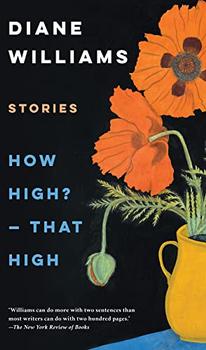Summary | Excerpt | Reviews | Beyond the book | Read-Alikes | Genres & Themes | Author Bio

Stories
by Edith PearlmanEdith Pearlman's previous story collection, Binocular Vision, was a finalist for several major book prizes and won the National Book Critics Circle Award. The achievement was especially remarkable because the collection was published by a tiny press, an imprint of the creative writing department at the University of North Carolina-Wilmington. In fact, Pearlman's three earlier story collections were also published by university presses. The attention Binocular Vision received following its NBCC recognition proves that book awards are still relevant and useful in getting the world to sit up and take notice. Now Pearlman's new collection, Honeydew, is published by a major publisher, helping ensure that she will reach the wider audience she deserves (the fact that the collection was recommended by Oprah doesn't hurt either).
Honeydew gathers twenty of Pearlman's short stories, all of which have been previously published in literary journals, including Ploughshares and Alaska Quarterly Review. It can be difficult to sum up a story collection in a relatively brief review, but this set feels remarkably unified without seeming too one-note. For one thing, the stories in Honeydew are set within a relatively limited geographic range—all take place in the Northeast, most either in New York City or in Pearlman's imagined Boston suburb named Godolphin. Perhaps unsurprisingly, given that Pearlman (who published her first collection at age sixty) is in her late seventies, several of the stories feature protagonists in late middle-age or older. Many of Pearlman's characters are members of the upper middle class: doctors, dentists, academics, teachers at Godolphin's fictional private girls' school, Caldicott Academy.
Thematically, there are many love stories, often quirky or unconventional. In "Castle 4," for example, several romances play out in parallel, including one between a shy anesthesiologist and one of the few people he's ever been able to talk genuinely to, a patient who also happens to be dying. In "Cul-de-Sac," a woman contemplating a second marriage to a financially secure but uninteresting man questions her choices when she witnesses the exuberant relationships enjoyed by the overly friendly woman in her little neighborhood. And in the powerful title story, the Caldicott Academy headmistress with a few secrets of her own conducts a passionate affair with the father of one of her students. Readers may be surprised to discover how frankly and frequently (and sometimes funnily) Pearlman writes about sex.
Most often, though, these stories are about the self in relation to others, more generally, about navigating solitude and friendship, and about defining what these relationships mean. A privileged white woman strikes up a friendship with a Somali survivor of female circumcision in "What the Ax Forgets the Tree Remembers," and an antique store owner (who appears in two different stories) finds herself wondering what it means to be a "best friend" when a woman who unexpectedly identified her as such becomes ill.
Like Alice Munro, Pearlman writes stories that are classic in form but never conventional. In particular, she is so skilled at seamlessly shifting between different narrative points of view that readers will often be entirely unaware of these moves unless and until they choose to analyze the story more fully. Unlike many contemporary short works, Pearlman's stories usually have satisfying narrative arcs that will appeal to many readers, even those unaccustomed to frequently reading short stories. And they are truly "short" stories—most clocking in at twenty pages or less, making them ideal brief escapes into vividly realized, beautifully written worlds and lives. Throughout, Pearlman exhibits an elegance with language that's essential for mastering the genre: "Something long contained burst from the competent woman sitting on the bed," Pearlman writes of the antiques dealer, "who did not love things though she traded in them, who did not love people though she pleased them."
One wonders what Pearlman thinks about all the attention she's received since her last collection won recognition; in a 2012 interview, she told The Boston Globe: "It's very important for a writer to be unnoticed...as quiet and unnoticed as possible." It's likely that many readers will be encountering Pearlman's work for the first time in the pages of Honeydew, and once they do, they will wonder how and why she escaped notice for so long.
![]() This review was originally published in The BookBrowse Review in February 2015, and has been updated for the
October 2015 edition.
Click here to go to this issue.
This review was originally published in The BookBrowse Review in February 2015, and has been updated for the
October 2015 edition.
Click here to go to this issue.

If you liked Honeydew, try these:

by Diane Williams
Published 2022
Diane Williams, an American master of the short story who will "rewire your brain" (NPR), is back with a collection in which she once again expands the possibilities of fiction.

by Nicole Krauss
Published 2021
In this dazzling collection of short fiction, the National Book Award Finalist and New York Times bestselling author of The History of Love - "one of America's most important novelists and an international literary sensation" (New York Times) - explores what it means to be in a couple, and to be a man and a woman in that perplexing relationship and...
Poetry is like fish: if it's fresh, it's good; if it's stale, it's bad; and if you're not certain, try it on the ...
Click Here to find out who said this, as well as discovering other famous literary quotes!
Your guide toexceptional books
BookBrowse seeks out and recommends the best in contemporary fiction and nonfiction—books that not only engage and entertain but also deepen our understanding of ourselves and the world around us.